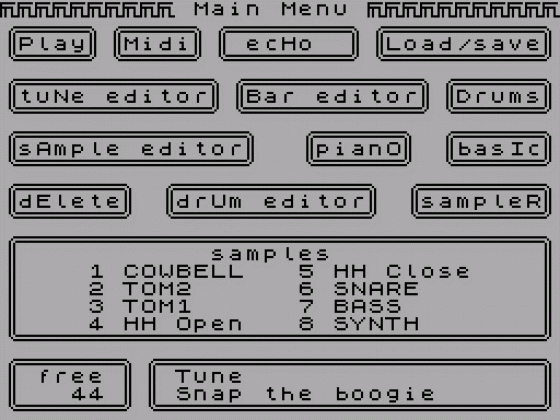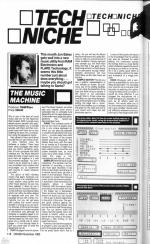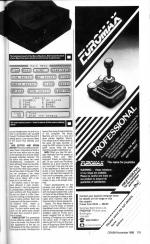Music Machine
This month Jon Bates gets well into a new music utility from RAM Electronics and FLARE Technology. It seems this little number just about does everything… maybe you should get talking to Santa?
This is one of the best all round music add-ons for the Spectrum that I've seen. With it you get a very decent sound sampler and sequencer that enables you to sample sounds, edit them and then compose tunes with them bar by bar into a composition using the sequencer option.
Very cleverly it has a set of drum sounds that you can use as a built-in drum machine once the software is loaded. There have been other packages that either give you drums, sampling, some sort of tune composer and MIDI interface but The Music Machine takes the best of each option and puts them all together in a well documented package. You don't need to be an expert as it uses a very simplified music notation that encourages you to experiment with sounds to whatever you want.

The option of MIDI interface means that RAM's hardware can become part of a complete home music system using synths and other music devices. As you may have realised, it does not use a sound chip for its sound. Rather, it comes with pre-recorded samples which can be either altered or replaced with your own. The package arrives with a dinky microphone, but you can get away with putting any sound source directly in so long as you are careful. All tunes, rhythms and samples can be saved onto either cassette or Microdrive and although the software is cassette based it too can be downloaded to Microdrive. Having loaded up, the main menu gives you a whole pile of option pages - I'll run through these to give you some idea of what the equipment can do.
PLAY All pages have this option and The Music System will either play your sample, drum sound, composed bar or complete tune depending on the page displayed. On the main menu page this option performs the factory-set demonstration tune.
PIANO This converts some of the top two rows of qwerty keys into a one octave keyboard on which you can play any selected or created sample direct from your micro - sounds really funny with drums! The name of the current sample played is displayed. The display does away with the need for an overlay as it illustrates the keyboard on screen. It might have been useful to have more than one octave available here, as most tunes use a wider range. Unfortunately this page is only monophonic (one note at a time).
SAMPLER Here life starts to get interesting. The sampler has two methods of recording a sound. Like most tape recorders it has either an automatic record level or a manual record level, set with a slider on the hardware. There is a bar graph on-screen that changes colour as the input level increases. In automatic mode recording only happens above a preset threshold. With the manual option any level can be recorded, but only if the trigger key is depressed. There are some limitations to the amount of sound you can record to - this is also in direct relationship to the pitch of the note. The general guide (without getting too technical) is that the highest note you can record is half the sampling rate. For our techno buffs this means that the highest note it will accept is 9.5kHz, which is well above the top notes of the piano, although a little limiting on the upper harmonics.
However, the total time capacity at present is only one second. So each of the eight samples had better be pretty damn short. Not to worry. As you will see, the Music Machine has some very useful features to help you around some of these problems. Having captured your sample you will more than likely find that it has gaps at the beginning and end, or that it simply is not percussive enough (headbangers anonymous will love this!). Back via the main menu we find the…
SAMPLE EDITOR This lets you see a graphic representation of your sample on screen. By judicious use of the editing facilities you can chop the blank bits of the start and finish off your sample. If the sound is not percussive enough (that is, it has a slow rise time) the you can chop the beginning of the sample to suit. For finite editing the page has a 'zoom' facility that enables you to enlarge the graph for the start and end of your sound and make the edit absolutely spot on.
Lovers of the bizarre will rejoice in the knowledge that the sample can also be reversed for weird effects. For continuous sounds like strings there is a loop facility which endlessly repeats the sound as long as you hold onto the key. All in all a pretty good effort at home sampling without the tears and frustration of a mega-overdraft.
ECHO Obviously, with a sampler the possibilities for echo and delay are abundant. You can delay your voice for up to one and a half seconds by selecting this option, noting the delay time on screen. I would be more effective if you plugged the microphone via a mixer that gave you separate outputs (or an effects send and return). This would allow you to mix the treated and untreated signal to give variable 'double-tracking' effects to whatever sound you have input. Real laughs start when you put headphones on and try to h01d a conversation with yourself through The Music Machine with it adding about a one second delay to the sound that reaches your ears.
BAR EDITOR AND DRUM EDITOR The prime difference between these compositional tools is that the drum editor lets you play all the samples and the bar editor accesses selected samples. The bar editor only allows two notes simultaneously (duophonic no less!), although these can be different voices. These options function much like other tune composers we have seen in the past in that you can compose a bar, mess around and gradually perfect it. Once you 're happy with a bar, move on to the next one....
The notation used is not standard, although it uses conventional staves the time signature is unreasonably inflexible at present: anything with three beats to the bar can upset it a little. However this is being corrected as this issue is being printed. Each bar composed can be given a name for instance 'intro ' , 'verse ' or whatever expletive comes to mind. The drum editor works very much on the same basis except that each drum sound is given a line on screen.
TUNE EDITOR This assembles the bar patterns created in either drum or bar mode. You have to list each appearance of the bar, so 256 repeats of bar One could be a bit of a pain to enter. One big minus here is that owing to the limitations of the computer The Music Machine will not run a tune and drum pattern together. Shame. This means that it's either down to the good old tape recorder or using the MIDI options to play the synth voices while the drum machine ploughs relentlessly on.
MIDI Either you play the samples internally from the qwerty or externally from your MIDI keyboard. Presto, an instant sampler. Or you could use The Music Machine as a drum machine. Or you could get it top play the tune in the sequencer in time with the drums in your keyboard. In other words it will send and respond to note on/off commands, pitch values, and the MIDI timing clock pulses on any or all sixteen channels.
Future developments for the package look good with a 128k version of the software out soon with increased sample time. Later on there will be software that converts the package to either a dedicated drum machine, MIDI realtime recorder or music sequencer. Clearly, The Music Machine is going to be the basis of several specialised music utilities. In general the whole package represents excellent value for money and I would suggest that as Santa is thinking of whipping his reindeer into action soon, it might be an idea to get him to do you the courtesy of dropping a Music Machine down whatever passes for your chimney.
Other Reviews Of Music Machine For The Spectrum 48K
Music Machine (Cheetah)
A review by Phil South, Michael Jones, Kay Ann Helen (Your Sinclair)


 1st November 1986
1st November 1986




